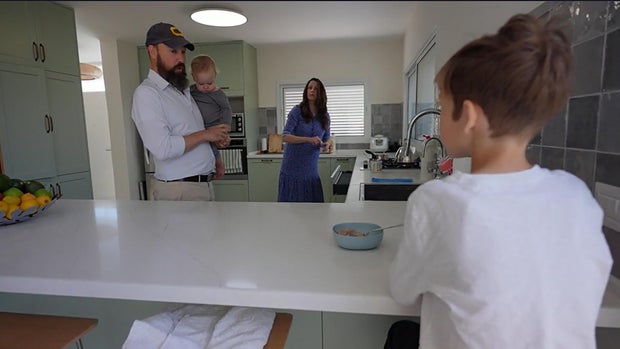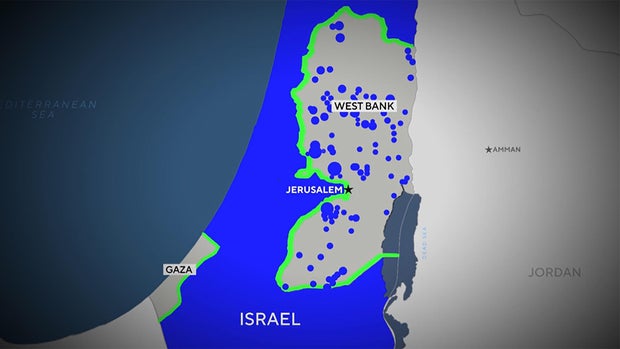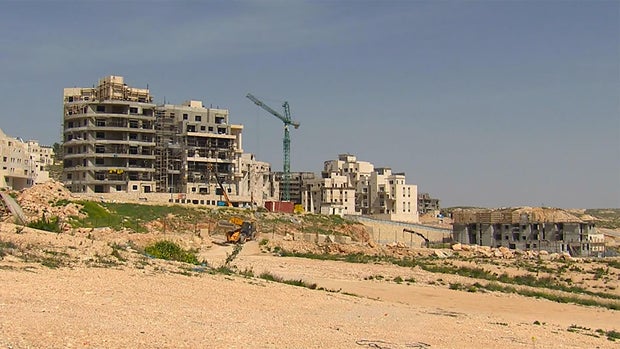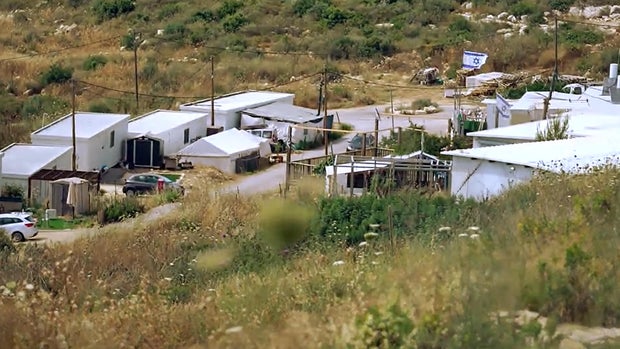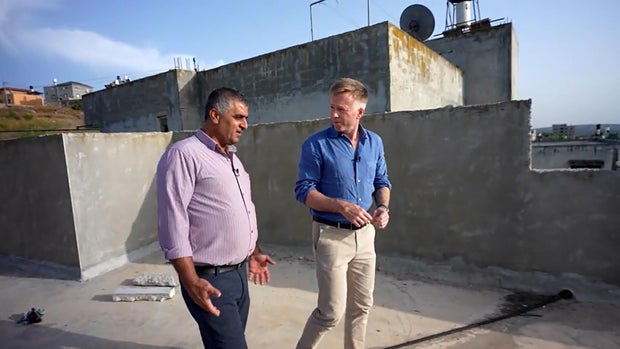Rachel Braslavi, a West Virginia native, says she moved to her new home so her family could have more space and a greater sense of community. But she faces bigger questions than you would when buying a typical home. Their community is the Israeli settlement of Karnei Shomron, located within the occupied West Bank.
Asked if she considered her settler family an obstacle to peace, Braslavi responded: “No. I don’t think so. I really don’t see that. I feel like we have a right to be here. And I feel like the Palestinians have a right to be here.”
“On this earth?” I asked.
“Not this house,” Braslavi said. “But I mean in the area.”
CBS News
This settlement, like hundreds of others, is dug into Palestinian land, surrounded by a security fence. The border that separates the West Bank from Israel is called the Green Line. It was painted as part of the armistice agreement that followed the 1948 Arab-Israeli War, which broke out when the modern state of Israel was formed.
But after Israel’s stunning military success in the Six-Day War in 1967, Israel seized more territory, occupied Palestinian territories, and Israeli citizens began building settlements.
Today, more than 700,000 Israelis live in these communities, which the United Nations describes as illegal. They are spread within the West Bank and East Jerusalem. About 15% of the settlers are Americans.
CBS News
But Rachel Braslavi doesn’t see herself living on Palestinian land: “No. I don’t think so. I think some of the first places Jews arrived in Bible times were in Judea and Samaria. So, for me, this is part of our original right to be here.”
I asked, “How much was your decision to move here to live in a settlement based on cost of living versus ideology?”
“I came from America when I was in my twenties to live in Israel,” she said. “I thought of this step as my contribution to the Jewish people in our homeland. It did not matter where I lived in Israel.
“My husband grew up here, and he saw it differently. He really believed that contributing in a meaningful way was to move across the Green Line and establish the facts on the ground.”
“What does ‘facts on the ground’ mean?”
Braslavi replied: “Only strengthening the existing Jewish communities in Judea and Samaria.”
“In the West Bank?
“Yes.”
The population of the settlements has increased by more than 200 percent since 2000. The Israeli government encourages these movements, pays for the army to guard them, and funds public services such as buses and schools.
CBS News
Judith Segaloff moved to Karnei Shomron seven years ago from Detroit, and says she was able to buy a larger home here than she could have on the other side of the Green Line. She took us on a tour. “Across the street is our mall,” she said. “We have an ice cream shop. This is our sushi shop.”
I asked, “Do you have friends or family members who disagree with you living in a settlement?”
“Absolutely,” Segalov said. “Some of them won’t come to visit.”
Segalov says she’s excited about plans to expand the settlement down the road. She believes that the Israeli presence provides security.
CBS News
“But it is also a contested place,” I said, “a place that is considered occupied territory.”
“By some,” Segalov said.
“By the international community.”
“Well, they’ll have to get over it,” Segalov said. “You can’t live among people who want to kill you. All they have to do is move in and let us in.”
But not far away, on the other side of checkpoints and a security barrier, we met Palestinian Saher Eid, who lives in the West Bank village where his great-grandfather was born.
In response to a question about the settlers’ claims that the land belongs to them – historically and biblically – Eid said: “We have documents proving that we own this land that we have been cultivating since forever. Ask the settlers where they are from?”
He and his wife, Tamador, a high school science teacher, invited us to tea. They say they are deeply concerned about the escalation of violence by Israeli settlers, encouraged by this The increasingly right-wing government of Benjamin Netanyahu. Since October 7 of last year, United Nations statistics indicate that there have been more than 1,400 attacks by extremist settlers against Palestinians or their property.
The Eades family is also frustrated that the fence and checkpoints surrounding the settlement have isolated them from their olive trees. Saher said his freedom was taken away: “He stole my land. He stole my olives. He stole everything.”
CBS News
“Is there any space for reflection here? Have you ever thought, ‘Maybe we’re not the best partners to try to find a path toward peace,'” she asked.
Al-Saher said, “We believe that if there was a Palestinian state without settlements, there would be broad support for peace.”
The differences on this side of the security barrier are stark. Income is a small fraction of that in Israel, and Israel controls water and a large portion of tax revenues.
Saher said that he would welcome an Israeli living in Tel Aviv into his home, not a settler: “No, because he is a thief.”
Assaf Sharon, Professor of Political and Legal Philosophy at Dr Tel Aviv UniversityHe pointed out that “James Carville was the one who coined the phrase, ‘It’s the economy, stupid.’ In Israel and Palestine, it’s the settlements, stupid.”
Regarding the settlers who claim that they did not take anyone’s land, and that no one lived there before them, Sharon said: “Well, of course, this was not done individually. Occupying land does not mean that you have a home.” It can be grazing land, it can be reserves for future construction, it can just be an area designated for the self-determination of the people.
I said: “The settlers are presenting a security argument, which is that Israel has become safer with the settlements.”
Sharon responded that “the security argument is completely false.” “Settlements are not security assets, but rather a guarantee criticalBecause defending and protecting dozens of civilians deep in the densely populated Palestinian territories constitutes a heavy burden on the army.”
He added: “The best way to ensure Israel’s security is to partner with a state or state-like entity that has an interest in specifically preventing this type of hostile activity.”
David Makovsky, Fellow at The Washington Institute for Near East PolicyHe said: “We have ideologues on both sides of this equation who are determined to thwart any settlement.”
In 2013, Makovsky was part of a team trying to negotiate a peace agreement. This failed proposal, along with two others, would have resulted in the Palestinians retaining approximately 95% of the West Bank.
But today, with the growing number of settlements – blue dots on the map, some far from the green line – defining borders in a two-state solution may be more complicated.
Makovsky said negotiations changed under Donald Trump: “Until Trump, all American peace approaches were similar. Under Trump, working with Prime Minister Netanyahu, he doesn’t want to pick and choose which settlements work and which don’t.” So, the Prime Minister convinced the President that every settlement should be called Israel. Now this creates an impossible situation of Swiss cheese, which will now be full of settlements.
Now, the settlers may have another ally who has influence over President-elect Trump’s nominee to be the next ambassador to Israel: Mike Huckabee, who has said he is open to annexing parts of the West Bank.
But there is historical precedent for evacuating settlements. For nearly 20 years, The Israeli government has called for leaving Gaza to be the path to peace.
According to Makovsky, “For the settlers, the year 2005 is like Waterloo and their defeat.” That’s when Israel removed all 8,000 settlers from Gaza.
At the time, I profiled a 17-year-old girl who was forced to leave the Gush Katif settlement in Gaza. Nineteen years later, the settlements still make front-page news. “Yes, this is the case in Israel,” Rachel Yehili Gross said. Today, she is a mother of three children and no longer lives in a settlement.
I asked him: “The fact that you left your home, your settlement when you were a teenager, shows that settlements can be closed. Could that be a step towards peace?”
“after October 7“I’m not sure anymore, because I really believed there could be a change. But I don’t feel that way anymore,” Gross said.
Makovsky blamed the terrorist movement Hamas, which he said “has actually led to the growth of the Israeli right.” If people in Israel believe that the Palestinian state is Costa Rica, they will line up to sign, because they want to end the conflict. They just want to be safe, but if they feel that a Palestinian state is a miniature Iran, you won’t find enough people in a phone booth.
Back in the West Bank, Rachel Braslavi and her family are just five of 700,000 Israeli settlers working to change “the facts on the ground,” as she puts it.
“I’m not leaving willingly, because I’m raising my family here and, you know, I’ve built my dream home,” she said. “Why should the peace agreement be at my expense to give up my home?”
For more information:
The story was produced by Sari Aviv. Editor: Ed Givnish.
https://assets2.cbsnewsstatic.com/hub/i/r/2024/12/21/8c6bdaaa-b1ca-4916-8116-2e56c09691cf/thumbnail/1200×630/130612155bef97ff6a974a4e5236b040/barbed-wire-1280.jpg?v=fa9977353833f46f40b07abcd9d5240b
Source link
